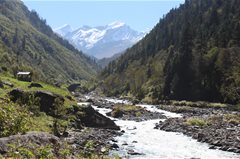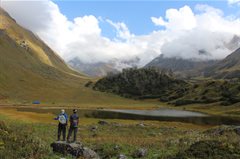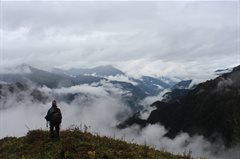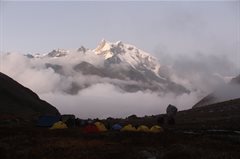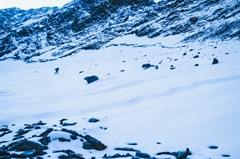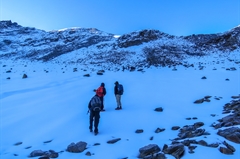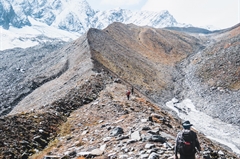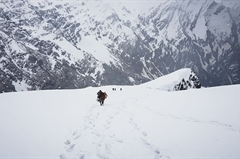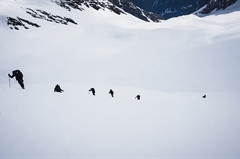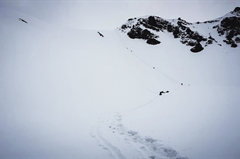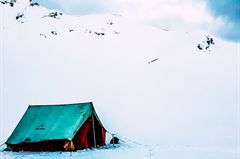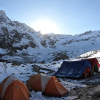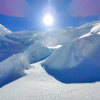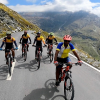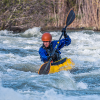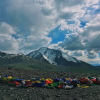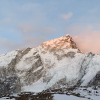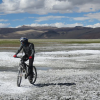Bali Pass Trek
A badass trek for seasoned trekkers
Available Batches
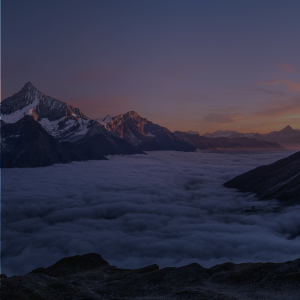


Brief Description
Brief Itinerary
Detailed Itinerary
Day 1
Arrive in Sankri
Distance: 195 kms (Dehradun to Sankri)
Duration: 6 Hours
Report in Sankri by 3 PM. Sankri is a tiny but a scenic town located in the region of Govind Pashu national park in the Uttarkashi district of Uttarakhand. It is around 195 km away from Dehradun. Private taxi takes around 6 hours to reach Sankri whereas bus takes around 8 hours to reach the same. Night stay & dinner will be provided by us. Stay will be arranged at a Guest house/Homestay.
Day 2
Sankri (1920 M) - Dhatmeer (2400 M) - Seema (2560 M)
Distance: 18 kms drive + 8 kms treks
Duration: 1.5 hour drive + 5-6 hours trek
Early morning drive from Sankri to Dhatmeer in a Taxi. The time taken for the drive is about 1.5 hour. Dhatmeer is the starting point of our trek. After Breakfast in Sankri, we will start trekking with packed lunch for Seema Camp (2560 M) from last road head of Dhatmeer on an even surface through thick forests of chestnuts, walnuts, willows, chinars and a variety of conifer trees. You will find a few waterfalls on the way. You could either opt for the steep climb of Dhaatmeer village or just trek along the Karmanasha stream. Both the routes meet at Gangaar village. Reach Seema Campsite by late afternoon. Overnight stay in tents.
Day 3
Seema Camp (2560 M) to Devsu Thatch (3100 M)
Distance: 6 kms
Duration: 4-5 hours
Today also, the trek is along the Supin river. The destination for today is Debshu Bugyal, from where we will get a magnificent view of Kala Nag or Black Peak. After crossing Seema, we will descend through the forest with loose stones and sandy path to the river. We will cross the Supin river through a bridge. After crossing the bridge, we will again ascend with the Supin river flowing now on our right. There are a couple of tricky sections with slippery path where we might have to take a diversion. Trek along the river until we reach our campsite, which is by the side of the river. Overnight stay in Camps.
Day 4
Devsu Thatch (3100 M) to Ruinsara Tal (3565 M)
Distance: 8.5 kms
Duration: 5-6 hours
This will be our last day when we walk along the Supin river. Today we will reach Ruinsara Tal by afternoon. Ruinsara is a lovely lake surrounded by meadows and rhododendron bushes. The trail is not difficult but it is tiring. The campsite is beautiful and we will have a chance to stay in wooden huts instead of camps. On one side of our camps is tiny lake of Ruinsara and on the other side is Supin River. The view from the campsite is mesmerising. On the south-west of Ruinsara Tal is Yamuna Kanta, the pass which takes you to Yamunotri and is rated as a difficult trek. To the east is the majestic Banderpooch Peak (6,387 m). The views of Dhumdhar Kandi (5,873 m) to the east, and Kala Nag (6,387m) and White Peak (6,102m) to the south-east are spectacular.
Day 5
Ruinsara Tal (3565 M) to Odari (4008 M)
Distance: 4 kms
Duration: 3 hours
Today is a short and easy trek of about 4 km. Initially we descend down to Supin river through the dense vegetation. Crossing the river through a bridge, we will then ascend to a small meadow and then head south east along the river. After a trek of 3 kms or so the trail meanders towards south west. Walking for a kilometre from here brings us to our campsite Odari. Odari means a naturally made rock cave. According to folklore, it is believed that Bali (Hanuman's brother) stayed in this cave for one night. The views from the campsite are spectacular. In the North East we will have the crystal clear view of mighty peaks of Swargarohini 1 & 2. In the later half of the day the learning sessions will be conducted for the participants on techniques that might be of use in the coming days.
Day 6
Odari (4008 M) to Base Camp (4678 M)
Distance: 3.25 kms
Duration: 3 hours
The day starts with a short hike south west to the base camp, but this hike would not be an easy one. We will have to walk on a mountain ridge with a 60 degree incline full of loose stones. This day is critical as we will be camping at a height of 4678 Metre. It is important to keep yourself active & hydrated to avoid chances of getting AMS (Acute Mountain Sickness). The temperature will drop to subzero levels increasing the difficulty many folds. Acclimatisation also takes longer at such heights. Overnight stay in camps.
Day 7
Base Camp (4678 M) to Lower Dhamni (3415 M) via Bali Pass (4950 M)
Distance: 10 kms
Duration: 8-10 hours
Today is the day because we will cross the Bali Pass (4950 m) and reach our next and also the last campsite, Lower Dhamni. We head south east towards the pass. Today's trek will be longer and the most challenging one. We will break camps and start trekking early in the morning at around 6 AM. The trail upto the pass remains full of snow which will require using the techniques learnt earlier. It will take around 2-3 hours to reach the pass from the base camp. Once we reach the pass, enjoy the 360 degree view of peaks such as Swargarohini, Banderpooch, Garhwal ranges and the Yamnotri valley. The most interesting as well as the difficult part of the trek starts after crossing the Bali Pass. We will descend down through a nearly vertical path full of scree and big stones. After crossing this leg, we will come across the goat route. To cross this leg, one needs to be mentally prepared because we will walk on an irregular path which is 6 inches or less wide in some places. After this extremely challenging part, we will rest for a while at a site called Upper Dhamni. After taking rest, we will resume our trek to Lower Dhamni. The path is a confusing one and therefore it is advised to stay with your trek leader and team.
Day 8
Lower Dhamni (3415 M) to Jaan ki Chatti (2650 M) via Yamunotri. Drive to Dehradun. Overnight hotel stay.
Distance: 9.5 kms
Duration: 5-6 hours
This will be our last day of trek. Initial trail is through forest which then merges into a cemented path. The trail is 4.5 km long with mild ascent upto Yamunotri. It will take around 1 hour and 30 minutes to reach Yamunotri. After reaching Yamunotri, you may take a dip in the Sulphur hot water springs of Yamnotri. Bathing in the hot water springs will take away the pain in your legs. From the shrine of Yamunotri we will take the regular pilgrims route to Jaan Ki Chatti which is around 5 km. We board the vehicle already waiting for us and drive to Dehradun. Overnight stay in hotel at Dehradun.
Day 9
Departure from Dehradun
The participants checkout from the hotel by 10 in the morning. You can plan your return travel from here.
What's Included
- Meals during the trek (Starting Dinner on Day 1 till Lunch on Day 8)
- Forest Permits/Camping Charges (only if availing transportation through Bikat Adventures)
- Tents on twin sharing basis, Sleeping bags, mats
- Micro-spikes, Helmets, Gaiters, as required
- Experienced Trek guide, cook, helpers, Mules or porters for carrying common supplies
- Mountaineering course certified Trek Leader with First Aid certification along with special rescue course from NIM, Uttarkashi
- Guest House/Hotel stay in Sankri on Day 1 & Dehradun on Day 8
What's Not Included
- Portage of personal bags during the trek
- Cost of any kind of Travel Insurance
- Any Expense of personal nature
- Any Expense not specified in the inclusions list
Are you Eligible for this Adventure?
Climbing up to an altitude of 4,950M, Bali Pass Trek is as challenging as it is beautiful. It is a difficult level trek perfect for someone with prior trekking experience looking to level up by a notch! This trek puts you through some really exciting challenges.
BRS Level Required
This makes it mandatory for you to have high-altitude experience of preferably multiple treks marked at level 4 on the BRS. The altitude, the terrain and the nature of the climb demand a certain level of skill and a need for you to be aware of how your body reacts to the various features of a high altitude environment.
If you do not know what level of BRS trek would suit you best, worry not! Fill out this Form:
we will send you a progression chart to help you comfortably get out of your comfort zone in order to level up and ultimately reach your highest potential in the big, bad world of outdoor adventure.
Packing List
This is a list of essential items for individuals doing the trek with Bikat Adventures. This list contains only those items which the participants are required to bring with them. The list excludes those items which are provided by Bikat Adventures on the trek. We have divided the items into five categories. All the items in the list are essential except for those marked as optional.
Trekking Gear
- Ruck sack bag with rain cover. Qty -1
- Day Pack Bag - Recommended for treks with summit day
- Head Torch with spare Batteries. Qty -1
- U V protection sunglasses. Qty -1 Here is how you can choose the best sunglasses for trekking.
- Water Bottles: 2 bottles of 1 liter each
Footwear
- Non-skid, deep treaded, high-ankle trekking shoes Qty -1
- Pair of light weight Slipper/Sandals Qty -1
Clothing
- Quick Dry Warm lower or Track Pants. Qty - 2
- Full sleeves T-shirts/ Sweatshirts. 1 for every 2 days of trekking
- Pair of thick woolen socks. 1 pair for every two days of trekking
- Thermal Body warmer Upper & Lower. Qty-1
- Undergarments. Qty - 1 for every day of trekking
- Warm jacket closed at wrist & neck .Qty-1
- Full sleeves sweater. Qty -1
- Rain wear ( Jacket & Pants ) . Qty-1
- Pair of waterproof, warm gloves. Qty-1
- Woolen cap. Qty-1
- Sun shielding Hat. Qty -1
Toiletries
- Personal toiletries kit (Small Towel, Toilet paper, paper soap, Bar soap, toothbrush, toothpaste, cold cream, etc.)
- Sun screen lotion small pack. Qty -1 Here is your Sun Protection 101 to stay safe in the bright sunny outdoors.
- Lip Balm small pack. Qty-1
Utensils
- Small size, Light weight & Leak proof lunch box. Qty-1
- Plate. Qty- 1
- Spoon.Qty-1
- Tea/Coffee (plastic) Mug.Qty-1
Miscellaneous
- Camera (Optional)
- Carry your medicines in plenty in case you have any specific ailment. Consult your doctor before joining the trek.
- Dry fruits, Nuts, Chocolate bars (Optional)
Frequently Asked Questions
Why Bikat?
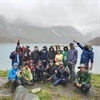

Small Group Size
Our batch sizes are capped at 15 for smaller treks with the trek leader and trekker ratio of 1:8. This ratio, in our years of experience, has proven to deliver the best trekking experience for individuals as well as groups. Capping the size of the group ensures individual attention to each trekker so that no signs of distress or need during the trek go unnoticed. It also helps to form a more cohesive cohort with better group energy which helps define the rhythm and pace of days on the trek. As you go higher up on the BRS scale, since the stakes are higher, expeditions have an even smaller group size with the ratio of expedition leader to climber set at 1:2.
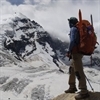

Qualified Trek Leaders
We follow a rigorous regime of hiring and training our experts in the field. Each trek leader is a certified mountaineer with years of experience in the field. In addition to their qualification, they also go through practical and situational training to tackle any and all kinds of sudden conditions that may present themselves on the ground. Being unpredictable is the core nature of the mountains but being ready for any circumstance as best as possible is a controllable asset that we try to nurture. Our field experts are also trained in basic medicine and first-aid response. Watch: Forerunners - The Making of A Trek Leader At Bikat Adventures
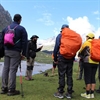

Guided Progression
Since Bikat Adventures is a learning-based organization, we help you climb up the ladder of difficulty within the sphere of outdoor adventure systematically. Our on-ground training modules are designed to handhold you through the upskilling process so that you are ready to take on bigger challenges.
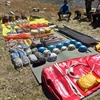

Equipment Quality and Check
All the gear used on our treks and expeditions is tried and tested, maintained for good quality, and is overall top-notch in quality and condition. We are continually looking to obtain the best of everything there is in the market so as to ensure optimum safety.
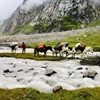

Support Systems
Along with the staff you see on-ground, we have a team of superheroes working in the background to give you the best experience possible. Our background team also comprises local staff from each area who know the region best. Having local support helps with studying the area, pre-planning, execution, and in receiving timely support in case of emergencies in these remote locations.
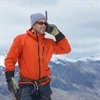

Communication
Our on-field staff is in constant contact with our teams based in primary locations so as to eliminate any avoidable delay in reaching additional help and support when required. We try to use the best tools for communication available, including satellite phones, in regions where they are not restricted.
What our customers Say
Cancellation Policy
Cash refund
Cancellations up to 60 days prior to departure date
Between 60 days upto 30 days prior to departure date
Between 30 days upto 10 days prior to departure date
Less than 10 days prior to departure date
Voucher refund
Cancellations up to 30 days prior to departure date
Between 30 days upto 15 days prior to departure date
Between 15 days upto 10 days prior to departure date
Less 10 days prior to departure date
- Cash refund is applicable only in case of bookings made without using any promotional offer code or Cancellation Vouchers or Discounts
- This is only a brief of cancellation terms. For finer details please refer Detailed Cancellation Policy.
Blog Posts
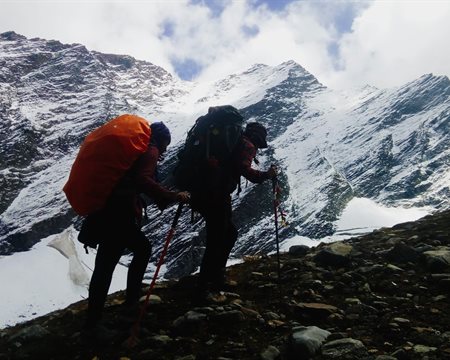
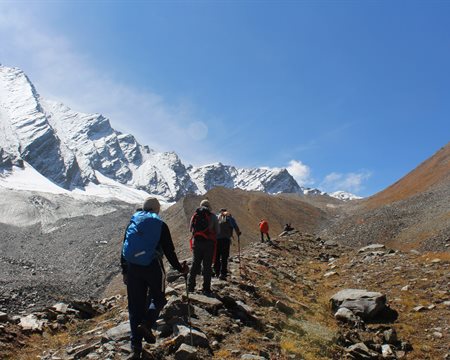
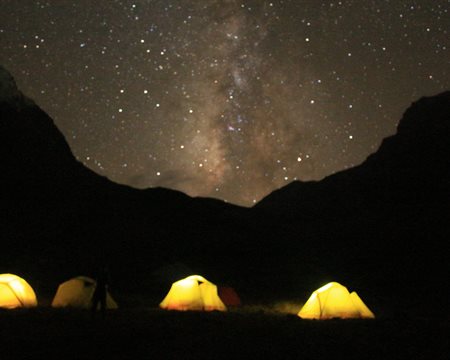
Similar Adventures
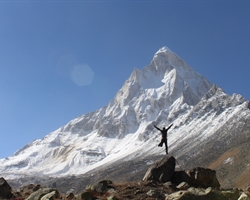
Vasuki Tal Trek
The closest one can get to Mt Shivling on a trek
Uttarakhand
9 Days
BRS 5
4880 m
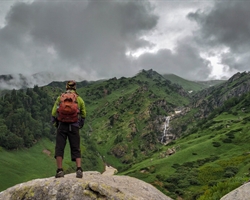
Kalihani Pass Trek
A challenging and off-beat gem of Himachal
Himachal
8 Days
BRS 5
4800 m
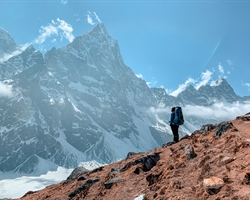
Everest Base Camp Trek
Walk where the Legends walked.
Nepal
14 Days
BRS 5
5545 m
